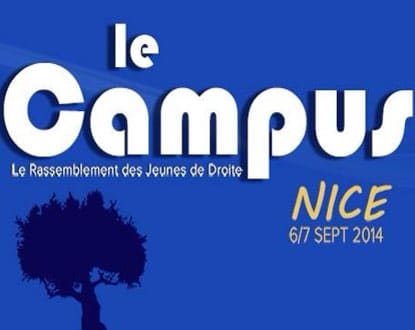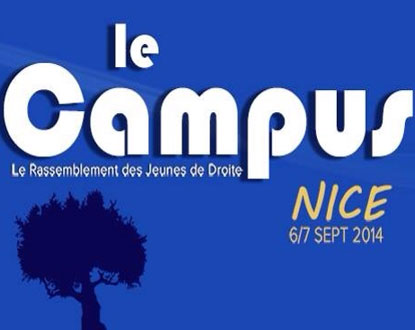We were expecting around 500 young people from all over France, but obviously, a large part of them must have gotten lost on the way because only a good hundred attended the plenary session on the first day, despite the evocative title: “Tomorrow, the UMP?”
 It is also possible, indeed highly probable, that others, after participating in workshops on various themes, chose to refresh themselves in the Mediterranean Sea located right across from the Théâtre de Verdure, the venue of the event.
It is also possible, indeed highly probable, that others, after participating in workshops on various themes, chose to refresh themselves in the Mediterranean Sea located right across from the Théâtre de Verdure, the venue of the event.
In this case, we must be lenient: Asking Nadine Morano to explain the future of community institutions is like asking a jester to talk to us about Descartes’ logic.
After listening to her, one surely needs a good, chilling bath (said with all due respect and sympathy for the willing neo-MEP).
We say attended because, apart from three speakers under 30, the debate was led by about a dozen elected officials, national leaders, and former ministers, each offering their analysis and recommendations, all legitimate, sometimes interesting but too often off-topic.
This debate seemed inevitable on the eve of a fundamental deadline for the life of the party: The election of its president after the current major crisis. Well, this debate did not take place or rather, there was a fictitious representation of a party through the prism of some of its leaders who have had, or aspire to have, responsibilities.
And the young people in all of this, you might ask? What is the model of a party that should represent their vision of politics and the values that unite them?
No one answered this question thoroughly and systematically: The few applause at the mention of a possible return of Nicolas Sarkozy or the cheers of support from the supporters of Bruno Le Maire are not political acts.
Similarly, interventions focusing on criticizing President Hollande and the government and the socialist decay can resemble an exercise in easy rhetoric (though often of a rather mediocre level) but in the end, shooting the ambulance has never made a soldier a hero.
The errors and faults of others do not provide the answer for analyzing one’s own.
It is not the fault of François Hollande and the left… If Nicolas Sarkozy and the right lost the presidential election in 2012 if the election of the Party President in the autumn of the same year turned out to be a massive cheating scandal if the Constitutional Court invalidated the campaign accounts of the President-candidate forcing the party into a fundraising operation unparalleled in any Western democratic country (Sarkhoton); if the party management turned out to be disastrous with the explosion of the Bygmalion scandal and the resignation of the incumbent President Jean-François Copé leading to the management of the party by a triumvirate; if the party is heavily in debt today…
You can always play the Diafoirus and at any time say “Hollande” like Molière made his character say “bloodletting,” but then what?
And when a speaker declares “the socialists are undermined by factions while our diverse sensitivities are enriching values”… well, the situation is poorly handled from that side too, isn’t it? Aren’t ideas more important than good casting?
So, it’s nice to hear “You young people, you are the future,” but who will give them room in the institutions? Certainly not many of the speakers at this debate who have all clearly demonstrated that they have no intention.
And then, how many young people under 30 sit on municipal councils?
In short, among these eloquent speakers (and even then…) and lesson-givers, two elected officials showed the way: Jean Rottner, mayor of Mulhouse, who recalled the values of common sense and proximity, the face of political commitment in service of citizens with clear language, simple but true words that evoke citizens’ trust in their elected officials’ actions. Something concrete!
Christian Estrosi, on the other hand, seems to be one of the few who understands the seriousness and stakes of the situation: “The party is undermined from within, it is moribund, it has no legitimacy and has no future under these conditions. We must start again from the bottom, from the territories, and from municipal officials,” he said and repeated.
“The time for formulas is over. We must end the technocratic bureaucracy and return to the fundamentals of political life: Listening to people and their needs and managing well,” he further stated in his speech.
Unlike his party colleagues, he understood well, going back to Descartes and his “Discourse on the Method,” that “common sense is the best-distributed thing in the world.”
Moreover, when opinion polls show that 70% of citizens have no confidence in traditional parties (both right and left), the alert threshold has perhaps been crossed.
At this point, it’s not the providential man that should be invoked, but the call should be made to the collective conscience of a community that recognizes itself in democratic freedoms.
To the young UMP members gathered in Nice, we ask for impertinence and not conformity, something new but on the condition that it is not a pale copy of the old.
This morning, before listening to the closing speech of Christian Estrosi, there will be one last plenary session titled: “Politics on the grill.”
Ladies and gentlemen… the youth: Be bold!


